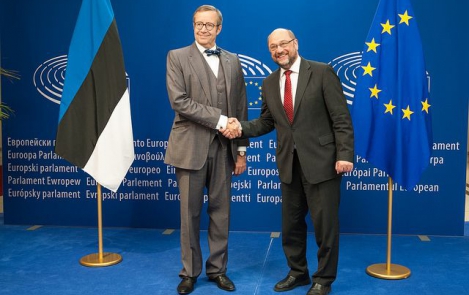-
Reset
+


Estonian Head of State discussed the migration crisis in Brussels with the President of the European Parliament and the President of Slovenia
22.10.2015
"The growth of extremist political powers is something I do not want to see against the background of the migration crisis. Massive numbers of refugees coming from the Middle East and North Africa today represent the most acute problem for Europe, and solving this problem requires solidarity from all the Member States, better control over the external borders of the European Union, the distinction between war and economic refugees and a condemning of intolerance," said President Toomas Hendrik Ilves in Brussels at a meeting with the President of the European Parliament, Martin Schulz, and the President of Slovenia, Borut Pahor.
President Ilves emphasised how we must realise that our ability to cope or our failure to deal with the current migration crisis will have a long-term effect on the future of Europe. "We need to ask a simple question – will the so-called Eastern European countries now demonstrate the solidarity that we have experienced from our partners and allies, or will they abandon it. I am sure that we will all ultimately opt for solidarity," said Ilves.
As for Estonia, the success story of our digital society and xenophobia are total opposites. "We cannot remain duplicitous in a situation where we are highly liberal in the sphere of information technology and expect the representatives of different nations to come and work in our country, yet become extremely conservative when it comes to migration issues," added the Estonian Head of State.
"On the other hand, we must also consider the capability of the European Union to manage the reasons behind the migration crisis and its consequences in entirety. Discussions between the ministers of the European Union focus more and more on the reasons for such a rush of refugees, and shared responsibility for the future of Europe is being sensed more acutely," he added.
The Head of State criticised the populist efforts of European right and left wing extremist political parties during the migration crisis: "They change the insecurity felt by people into fear in order to collect votes and popularity – this is hardly responsible behaviour."
The President of the European Parliament, Martin Schulz, and President Ilves discussed the security-related challenges that Europe is facing, focusing on the activities of Russia in Ukraine and Syria. "Without performing the Minsk Agreement, it is impossible to move to a new level in relations between the European Union and Russia," stated the Estonian Head of State, who also said that Russia's intervention in the Syrian civil war and the bombing of opposition armies by Syrian President, Bashar al-Assad, will only serve to bring in more war refugees and aggravate the migration crisis. Ilves and Schulz also discussed the co-operation between the European Union and Turkey in solving the refugee crisis.
The establishment of a single digital market and the promotion of business in the European Union were also discussed at the meeting with the President of the European Parliament.
Today, President Ilves will give a presentation at a digital society panel of a high-level seminar organised by Friends of Europe think-tank. Tomorrow, the Head of State will meet with the President of the European Council, Donald Tusk, and with Andrus Ansip, Vice President for the Digital Single Market of the European Commission.
Office of the President
Public Relations Department




